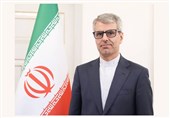Gamma Irradiation Plant Opens in Iran
TEHRAN (Tasnim) – The Atomic Energy Organization of Iran (AEOI) launched the country’s first multi-purpose gamma irradiation plant, planning to open 11 other ones until March 2024.
AEOI chief Mohammad Eslami traveled to East Azerbaijan province in northwestern Iran on Thursday to open the gamma irradiation plant in the city of Bonab.
Eslami said the movable plant will mostly offer waste control services to Iranian farmers in the area, adding that Iran will be able to reduce agricultural waste by over 30% by using the system in other parts of the country, Press TV reported.
“The main application of this system is to irradiate food and agricultural products to reduce their susceptibility to pests and to increase their storage life,” he said.
The AEOI chief said the organization has identified other locations in Iran for launching similar gamma irradiation plants.
Eslami said works on designing and assembling the gamma plant installed in Bonab had started in January by AEOI technicians and engineers.
The official said the current version of the homegrown gamma irradiation plant is able to process 20 metric tons of agricultural products per day, adding that the capacity could increase depending on the need of the farmers and the readiness of the privately-owned food processing factories in Iran.
Food irradiation is the process of exposing foodstuffs to gamma rays to kill bacteria that can cause food-borne disease, and to increase shelf-life. It has the same benefits as when food is heated, refrigerated, frozen, or treated with chemicals, but does not change the temperature or leave residues.
In all parts of the world there is growing use of irradiation technology to preserve food. More than 60 countries worldwide have introduced regulations allowing the use of irradiation for food products including spices, grains, fruit, vegetables, and meat.
It can replace potentially harmful chemical fumigants used to eliminate insects from dried fruit and grain.
According to FAO, nuclear techniques help national authorities in over 50 countries to improve food safety by addressing the problem of harmful residues and contaminants in food products and to improve their traceability systems with stable isotope analysis.






